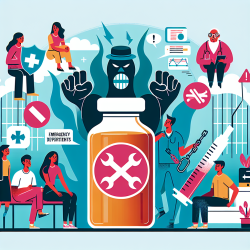The opioid crisis remains a significant public health challenge in the United States. With over 100,000 drug overdose deaths recorded in a single year, the need for effective intervention strategies is more pressing than ever. The Behavioral Health and Racial Equity (BeHERE) Training Initiative has emerged as a pivotal player in addressing this crisis by offering virtual training modules designed to build capacity among practitioners in non-substance use disorder (non-SUD) settings.
The Importance of Virtual Training
The COVID-19 pandemic accelerated the transition to virtual learning, demonstrating its potential as a cost-effective and accessible alternative to traditional in-person training. BeHERE capitalized on this shift by delivering 224 online trainings between April 2020 and June 2022. These sessions focused on overdose prevention, harm reduction, and addressing drug-related stigma among other critical topics.
Key Findings from the BeHERE Evaluation
A mixed methods evaluation based on the Kirkpatrick Training Evaluation Model revealed that BeHERE’s trainings were not only relevant and engaging but also significantly enhanced the knowledge, skills, and confidence of participants. The evaluation highlighted several key aspects that contributed to the effectiveness of these virtual trainings:
- Engagement and Interaction: Participants appreciated the interactive nature of the sessions, which fostered dialogue and peer learning.
- Expert Facilitation: Trainers were praised for their expertise and ability to create a safe learning environment.
- Practical Application: The training provided actionable insights that participants could apply directly in their work settings.
Implications for Practitioners
The success of BeHERE’s virtual training initiative offers valuable lessons for practitioners seeking to enhance their skills in supporting people who use drugs (PWUD). Here are some ways practitioners can leverage these insights:
- Embrace Continuous Learning: Engage with virtual training opportunities to stay updated on best practices in overdose prevention and harm reduction.
- Apply Knowledge Practically: Use the skills acquired from training to improve client interactions and outcomes.
- Advocate for Policy Change: Leverage training insights to influence organizational policies that support harm reduction and reduce stigma.
The Path Forward
The evaluation of BeHERE’s initiative underscores the potential of virtual training to transform practice in non-SUD settings. As more practitioners embrace online learning, it is crucial to continue refining these programs to meet evolving needs. By doing so, we can ensure that staff across various human service settings are well-equipped to address the complex challenges associated with substance use.
For practitioners interested in further exploring this topic or implementing similar strategies, we encourage you to delve into the original research paper: BeHERE’s effective virtual training to build capacity to support people who use drugs in non-substance use disorder settings.










